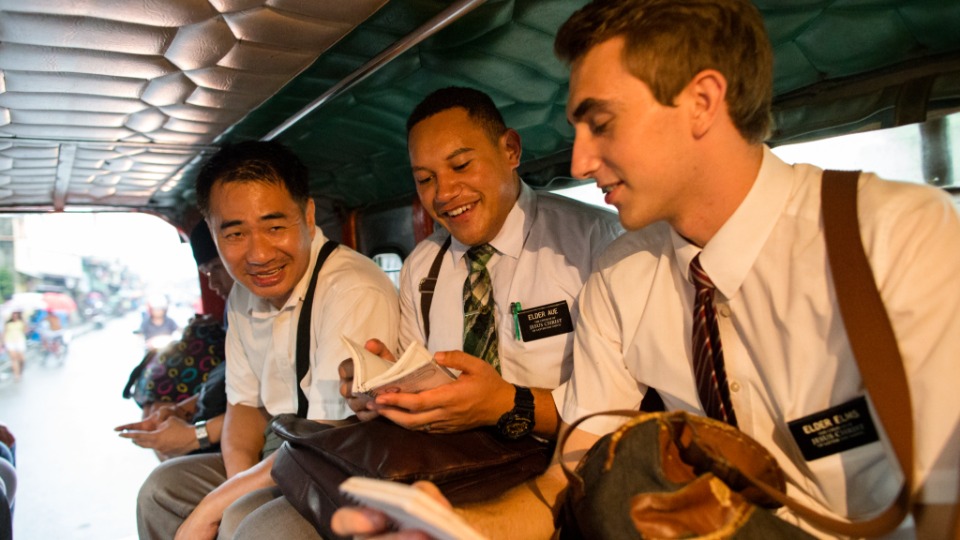Every year, tens of thousands of young Latter-day Saints answer the call to serve as volunteer full-time missionaries of The Church of Jesus Christ of Latter-day Saints. Some serve locally, and many travel to locations all over the world. Missionaries serve at their own expense and put their personal interests aside to focus on serving others and God. They bring light by sharing the message of the gospel of Jesus Christ and seek to follow His example.
Nearly 80,000 young women and young men serve in one of 450 missions for periods of 18 to 24 months. Each of these individuals has family, friends and Church members who love and support them. The well-being and safety of these missionaries are our priority, and each missionary is expected to complete training and follow missionary standards to help protect them and reduce risk while they serve.
- edf1d5e8ee3111eca935eeeeac1ecdb91695f41a.png
- 6b06384ba5eb11ecb962eeeeac1ef8bc53685dd8.png
- fc91cecd0a7f530456cd8bbdec4ac76660240fb3-(1).jpeg
- 973ad7a30de511ecbf18eeeeac1e5d0b298f70ce.png
- 6abf73ae2fa311ed8dfeeeeeac1e2ed9a362ae9b.png
- 0eb01958ee3211ecaa63eeeeac1effe1ff9f6b89.jpeg
- d825a0261fcb11edb5a7eeeeac1e9c0d556408d1.jpeg
- 5462840da5ec11ec8167eeeeac1e8c613cc3259b.jpeg
| Temple Square is always beautiful in the springtime. Gardeners work to prepare the ground for General Conference. © 2012 Intellectual Reserve, Inc. All rights reserved. | 1 / 2 |
To assist journalists and the public with questions and concerns regarding the safety and well-being of missionaries, the following is a summary of the standards and the types of training missionaries receive to help protect them physically, spiritually and emotionally in their day-to-day service.
Missionary Standards
- Live the commandments (moral purity, honesty, and healthy living)
- Take care of physical health and exercise regularly
- Focus on mental health and emotional well-being
- Stay together in assigned companionships
- Regularly communicate with family
- Follow guidelines before entering someone’s home, including ensuring you are not alone with someone of the opposite sex
- Return home by 9 p.m. or earlier, depending on local conditions
- Use technology wisely and avoid disclosing personal information
- Do not carry cash or anything of significant value
- Avoid contact sports or any other high-risk activity, including swimming
- Promptly report safety threats, including assaults and harassment
- Follow service guidelines, which includes not handling dangerous machinery

6b06384ba5eb11ecb962eeeeac1ef8bc53685dd8.png
Missionaries in the Philippines.© 2024 by Intellectual Reserve, Inc. All rights reserved.Training
Principles of missionary safety are reviewed regularly and repeatedly in settings such as missionary training centers, mission training conferences and daily personal and companion study. Topics include:
- Automobile safety (driver certification program, seatbelts and driver monitoring systems in some locations)
- Bicycle safety (including safety equipment)
- Carbon monoxide and smoke detectors
- Courtesy and cultural awareness
- Diet, hygiene, and exercise, including food preparation and safe drinking water
- Electrical safety
- Insect bite protection
- Pedestrian safety
- Proper behavior with children
- Safe housing
- Natural disasters or political unrest
- Situational awareness
- Stress management

The booklet “Missionary Standards for Disciples of Jesus Christ” is supplemented by 12 engaging and informative “SafetyZone” videos. These were released in 2019 to inform missionaries about potential hazards. The videos are viewed in missionary training centers and periodically throughout a missionary’s service.
Conclusion
Even with precautions and safety guidelines, some missionaries experience accidents, crimes or unforeseen medical issues. Tragically, at times these incidents have resulted in the serious injury or death of a missionary. In these difficult situations, the Church works to provide help and support to the missionary and their family. You can access numerous resources in the Gospel Library. They teach missionaries these principles of safety. We appreciate the interest of those who may report on the safety of missionaries and invite you to use these resources in your coverage.